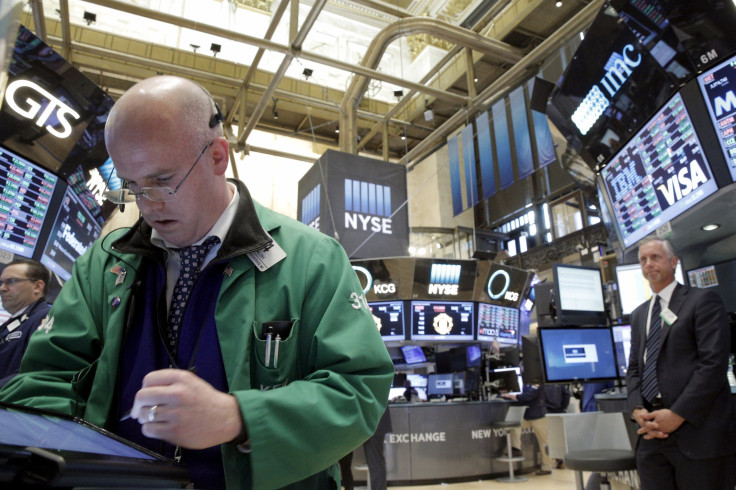Thursday's Stock Market Close: US Equities Plunge As Traders Shrug Off Fed Stimulus, Dow Drops 10%

KEY POINTS
- U.S. stocks have entered period of unprecedented volatility.
- The Fed will pump more than $1 trillion into economy to fight virus effects.
- NBA, NHL, MLB have suspended or delayed their seasons
U.S. stocks plunged on Thursday as traders shrugged off huge stimulus measures by the Federal Reserve and scorned President Donald Trump’s 30-day travel ban on most European countries – both designed to fight the economic impact of the coronavirus outbreak.
The Dow Jones Industrial Average dropped 2,352.27 points to 21,200.87 while the S&P 500 fell 260.75 points to 2,480.63 and the Nasdaq Composite Index tumbled 750.25 points to 7,201.80.
The Dow, which dropped nearly 10%, recorded its biggest ever one-day point drop, beating the prior record set on Monday. In this week alone, the Dow suffered its three highest daily point declines in its history.
Volume on the New York Stock Exchange totaled 7.5 billion shares with 66 issues advancing, two setting new highs, and 2,999 declining, with 2,370 setting new lows.
Active movers were led by General Electric Co. (GE), Bank of America (BAC), and Apple Inc. (AAPL).
The coronavirus has now infected more than 126,000 people around the world and killed at least 4,600.
The Fed said it will increase its overnight funding operations to more than $500 billion and will also offer more repo operations totaling $1 trillion on Friday. The Fed also enlarged the types of securities it will purchase with reserves.
“These changes are being made to address highly unusual disruptions in Treasury financing markets associated with the coronavirus outbreak,” said the New York Federal Reserve.
Analysts were nonetheless unimpressed by the Fed’s latest actions.
“We continue to emphasize that this Fed will act aggressively and in particular that central banks are focused on safeguarding market functioning at this point, and will continue to provide liquidity in scale,” said Ebrahim Rahbari, director of global economics at Citi Research. “However, despite the sharp initial risk rally, we think these measures will still not be sufficiently to durably stabilize market sentiment yet in light of credit concerns and escalating health concerns.”
“The virus was the catalyst but it’s not the cause,” said Christopher Whalen, founder of Whalen Global Advisors. “Both bonds and equities were inflated rather dramatically by our friends at the Fed. You’re seeing the end game for monetary policy here, which is at a certain point you have to stop. Otherwise you get grotesque asset bubbles like we saw, and the engine just runs out of fuel.”
On Wednesday evening, U.S. President Donald Trump imposed a one-month travel ban on 26 European countries. Trump also asked for lending aid for small businesses and payroll tax relief.
On Thursday, the European Central Bank kept interest rates unchanged but expanded its quantitative easing program by 120 billion euros ($135.28 billion).
“Market moves suggest monetary stimulus has reached its limits,” said Lucas Bouwhuis, a portfolio manager at Achmea Investment. “Most of the stimulus needs to come from the fiscal side and we are just not seeing enough of that yet.”
Economists and experts were befuddled by the ongoing crisis.
“The coronavirus is scary and people don’t know what to expect,” said Kathy Entwistle, senior vice president of wealth management at UBS. “It’s like the tsunami is coming. We know it’s going to hit any day and nobody knows what the outcome is going to be.”
“We are going into a global recession,” said Mohamed El-Erian, chief economic adviser at Allianz. “After what’s been happening the last few days, we are going to see a spread of economic sudden stops. The trouble with economic sudden stops is it’s not easy to restart an economy.”
“The market will need much more to get its confidence back,” said Mohit Kumar, managing director at Jefferies International Ltd. “The economic slowdown is because consumers won’t spend as they don’t go out or travel --- you can’t make them spend by giving cheaper money. What you need is fiscal stimulus -- helping [small businesses] and helping banks.”
The National Basketball Association has suspended its season after a player on the Utah Jazz tested positive for coronavirus. The National Hockey League also suspended its season. Major League Baseball will suspend spring training, delay opening of the regular season.
In U.S. economic data, jobless claims fell by 4,000 to 211,000 for the week ended Mar. 7, according to Labor Department.
The Labor Department also its producer price index fell by 0.6% in February -- the biggest drop in five years – due largely to a decline in energy costs. The data followed a 0.5% rise in January.
Overnight in Asia, markets closed lower. China’s Shanghai Composite tumbled 1.52%, while Hong Kong’s Hang Seng fell 3.66%, and Japan’s Nikkei-225 dropped 4.41%. India’s BSE Sensex plunged 8.18%
In Europe markets suffered massive losses as Britain’s FTSE-100 fell 10.25%, France’s CAC-40 plunged 11.85% and Germany’s DAX dropped 11.41%.
Crude oil futures plunged 5.88% at $31.04 per barrel, Brent crude dropped 1.44% at $32.74. Gold futures dropped 4.43%.
The euro slipped 0.76% at $1.1184 while the pound sterling fell 1.74% at $1.2598.
The yield on the 10-year Treasury gained 3.54% to 0.849% while yield on the 30-year Treasury jumped 7.57% to 1.407%.
© Copyright IBTimes 2025. All rights reserved.





















